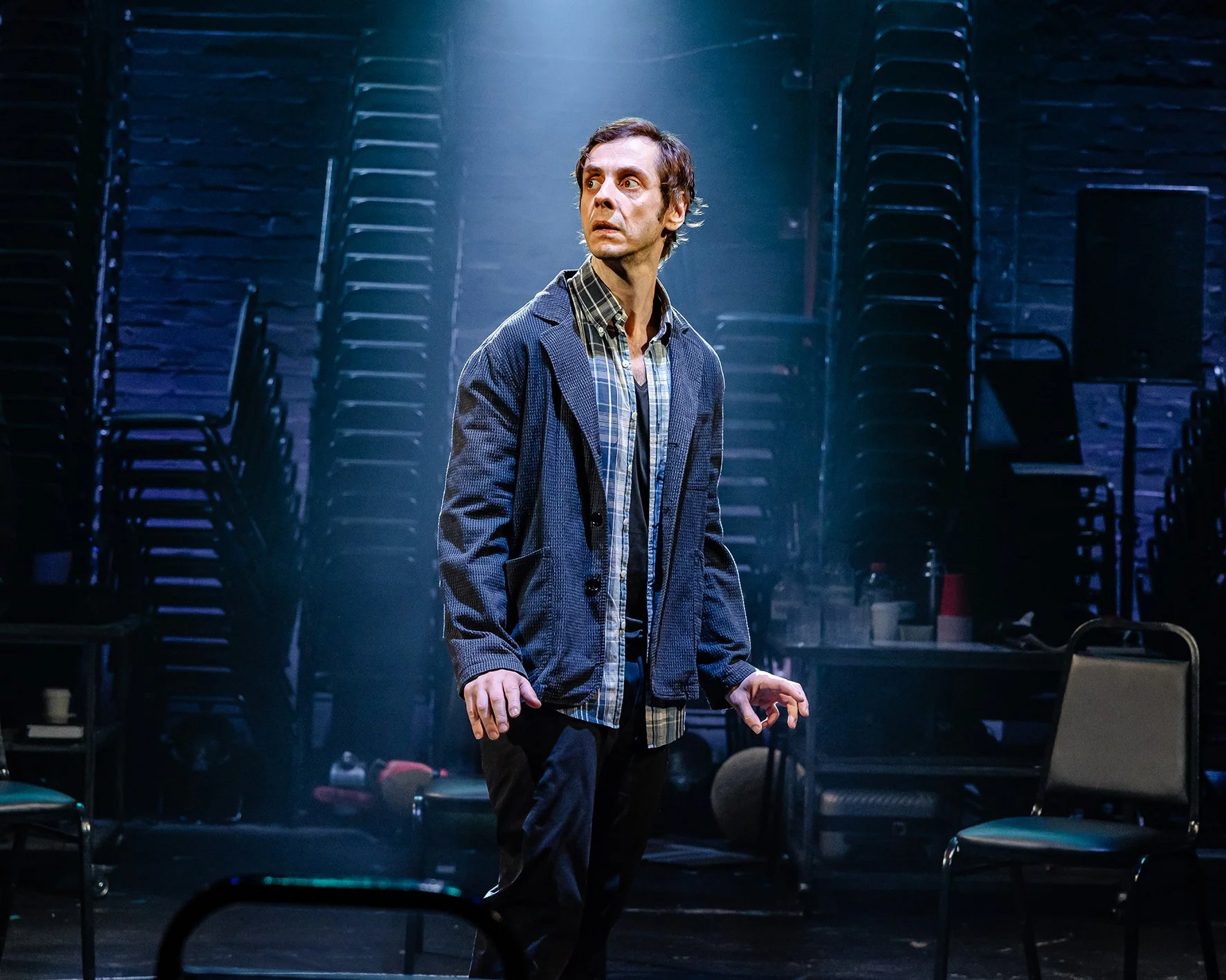The White Chip at Southwark Playhouse Borough Review
Ed Coleman in The White Chip. Photo by Danny Kaan
Written by Eleanor B for Theatre & Tonic
Disclaimer: Gifted tickets in exchange for an honest review
The White Chip, written by Sean Daniels, is an autobiographical piece that shares his story and experiences with alcoholism, along with the often uncomfortable realities of recovery.
The main character, Steven, is played with real sensitivity and energy by Ed Coleman. He’s a charismatic, extroverted figure who, after having his first drink as a young teen, slowly finds himself relying on alcohol to feel confident, to have fun, to fit in. What begins as a social habit gradually becomes a dependency that follows him through every stage of his life.
We trace Steven’s journey from his upbringing in the Mormon church, through university, and into a senior role in theatre. Alongside his father’s Parkinson’s diagnosis and the pressures of adult life, alcohol becomes a constant presence. From a crash course in how to day drink without raising suspicion to an impulsive Vegas wedding, the play captures the chaotic but functional world of a high-performing alcoholic over the course of 100 fast-paced minutes.
Although the focus is on Steven, he’s supported by two brilliant cast members, Mara Allen and Ashlee Irish, who switch seamlessly between a wide range of characters: from his parents and colleagues to lovers and barmen. They also help shape the rhythm of the play, moving the minimal set in a way that keeps the transitions fluid and the focus firmly on Steven’s story.
Ed Coleman and Mara Allen in The White Chip. Photo by Danny Kaan
The creative team behind this production have crafted a clear, thoughtful vision that supports every stage of Steven’s journey. Director Matt Ryan, along with Set and Costume Designer Lee Newby, Lighting Designer Jamie Platt, and Sound Designer Max Pappenheim, have transformed a small, minimalist space into something versatile and emotionally expressive. Each shift in lighting, sound and movement quietly signals a new phase in Steven’s life, giving the audience clear emotional cues without overwhelming the storytelling.
In a world like the arts, eccentricity is often overlooked or even celebrated. “You’re an artist! You’re expected to be eccentric,” a colleague tells Steven. It’s just one of many excuses that allow him to continue spiralling without too many questions.
But the cracks begin to show. His previously tolerant peers start noticing what Steven can no longer hide. We follow him into his first Alcoholics Anonymous meeting, where the lighting sharpens and the tone shifts. It’s a moment of clarity, framed with care.
At AA, newcomers are given a white chip, a small but powerful symbol marking day one of sobriety. Steven collects several of these throughout the play, but each time he’s welcomed back without judgment. That gentle repetition makes the experience feel all the more human.
We watch him wrestle with relapse, loss and loneliness, until eventually, on the back of a particularly destructive binge, he reaches out to the one person he knows will pick up: his mother. Their relationship begins to change in the most unexpected way as she shares her own struggles with alcohol, helping him through rehab and the grief that follows his father’s death.
It’s from here that the tone lifts. Steven finds strength not in blind faith but in science. As explained in one of the show’s most memorable moments, it’s all about retraining the brain. Alcohol floods the body with dopamine, but after 90 days sober, the body starts to find balance again and that breakthrough becomes a turning point.
According to Drinkaware, 28% of people in the UK were concerned about someone else’s drinking in 2024. This play, with its mix of humour, honesty and heart, offers a powerful glimpse into what that struggle might look like from the inside. It’s a meaningful watch, whether you’re trying to understand someone close to you or simply want to see how addiction and recovery can be explored with nuance and care.
The show runs until 16 August at Southwark Playhouse Borough. Thoughtful, sharp and beautifully performed, it’s well worth a visit.
★★★★★


